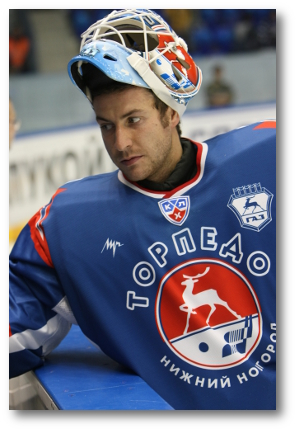Here’s an excerpt from This is Russia: Life in the KHL – Doctors, bazas and millions of air miles, Bernd Brückler’s memoir of his three seasons in the Kontinentalnaya Hokkeynaya Liga (KHL), founded and financed by Russian oligarchs.
In 2011, “Brucks” signed with Sibir Novosibirsk, and succeeded Team Sweden goaltender Stefan Liv as the team’s goaltender. A few months later, the entire Lokomotiv Yaroslavl perished in a plane crash as the team was on their way to their first regular season game of the season. Below is Brucks’s story from the inside.

We knew the risks of aviation in Russia. We had heard stories of drunk pilots, and stories of pilots who had put in just a fraction of the required flight hours, buying the rest on the Internet. But nobody ever expects these stories to happen to him, right?
In 2011, I left Torpedo and Nizhny Novgorod for Sibir Novosibirsk, in Siberia. Our regular season opener was in Omsk, and I was the new goalkeeper on the team, taking over from Stefan Liv, a Swedish top goalie. As soon as we touched down, and everybody turned their cell phones on again, we started to get text messages about a plane crash that killed the entire Lokomotiv team, even before we had left the plane. The initial news reports were vague, with no information on the death toll — or whether anybody had survived. In Austria it was just reported that “a hockey team” had crashed, and my family, of course, was worried.
We went straight to the rink and practiced because we didn’t know what else to do. We didn’t know what was going to happen to us, our game, the league. Back at the hotel, everybody tried to get more information on what had happened.
Oddly enough, I didn’t personally know any of the Lokomotiv players who died. But our head coach was from Yaroslavl, one of our players, Jori Lehterä had played with Lokomotiv, and everybody who had been on the previous year’s team had been friends with Liv.
By the time we got to the hotel, my roommate David Petrasek had heard that Stefan had died. They were best friends, and he was beside himself. He spoke with his wife, he spoke with Stefan’s wife, and he was crying his eyes out.
I felt helpless.
A short while later, we were told that our game had been cancelled, and that the season was going to be delayed. The team actually took a vote on whether to fly back, or whether to take the train. I voted for the flight; it was going to be a fifteen-hour train ride, and, to be honest, I didn’t trust the trains any more than the planes. But there were guys who thought we shouldn’t tempt our fate since we had flown in on the same type of plane as the one Lokomotiv had flown, a Yakovlev Yak-42.
The club offered to pay everybody’s way to the funeral, and they encouraged players to do it. Half a dozen players did go to the funeral, but I decided not to attend.
I was struck by how all the players came together; it was unbelievable. I have never seen a memorial like the one we had in Novosibirsk for Lokomotiv, a team from another city. Outside our arena, the stack of flowers was a meter high, and people left candles, flowers, pictures and hockey jerseys. Three former Sibir players were on the Lokomotiv team.
In our locker room, we had a stall for Stefan Liv for the whole season. His jersey hung there among some religious icons, and before every home game, there would be fresh flowers and a lit candle.
After the accident, there was talk about new planes, Western pilots, and Western pilots training the Russian ones – but we still flew on a Yak-42 until the last road trip of the season.
– – –
This is Russia: Life in the KHL – Doctors, bazas and millions of air miles is now available on Amazon.
